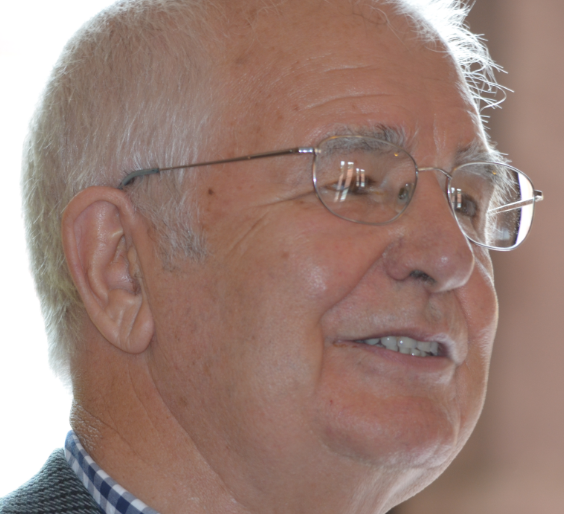Frank Wilkinson 1934-2021
Remembering one of the founders of IER

Frank Wilkinson
1934-2021
I
Frank Wilkinson, leading labour economist of the Cambridge school, died peacefully at his home in Over, outside Cambridge, on 24 March 2021. Frank was a research officer in the Department of Applied Economics from the late 1960s to his retirement in 2001, and a founder member of the Centre for Business Research in 1994. He was also a Fellow of Girton College, teaching successive generations of economists from his election (as one of the first two male Fellows of the College) in 1977. He will be remembered by the IER’s members and supporters especially for his pioneering work on minimum wage legislation, which made the economic case for a living wage decades before it became government policy in the UK and numerous other countries.
II
Born in Ilkeston, Derbyshire on 10 August 1934, Frank was the fourth of eleven children. After leaving school at 15 (despite his beloved mother Rhoda’s wishes for him to remain in education), he became a farm labourer and in December 1952 started national service as a cook in the Army Catering Corps – which inspired a lifelong love of cooking. On his return from national service, Frank moved from farming to become a steel worker at Stanton Iron Works. From there in 1959 he started day release on a joint venture between the Workers’ Educational Association and Nottingham University Extra-Mural Department.
Encouraged by one of his lecturers to apply for a trade union scholarship to attend Ruskin College, Oxford in 1961, Frank subsequently won a place at King’s College, Cambridge to read economics. After graduate work he took up a research fellowship in the Department of Applied Economics, where he collaborated with the then Montague Burton Professor of Industrial Relations, H A Turner. Their paper ‘The wage-tax spiral and labour militancy’, published in 1972 as part of the volume Do Trade Unions Cause Inflation? (co-authored with Dudley Jackson), showed that a major cause of rising strike activity in Britain was the fall in net wages brought about by increases in taxation from the mid-1960s onwards.
The idea that government itself, through its fiscal policy, was to blame for the ‘strike problem’, was controversial. The academic and political consensus of the time pinned the responsibility for rising inflation on the system of wage bargaining. This view led to the Labour Party’s abortive attempt at labour law reform, In Place of Strife in 1969, and the Conservative Party’s equally unsuccessful Industrial Relations Act 1971, which in practice did much to undermine the fragile consensus which had hitherto existed between employers and trade unions, and helped usher in a decade of turbulence in British labour relations. The ‘wage-tax spiral’ paper set a template for Frank’s later work: it was original (and even somewhat dissident) in its conception, data-rich in its approach, and applied in the best sense of generating insights of relevance to the real world. The fact that its key findings were ignored by policy making elites was also to set something of a precedent.
Over the course of the following decade, Frank’s work deepened into an analysis of the economic, social and political factors driving labour market outcomes in the UK and beyond. Frank made an immense contribution to the development of economic theory, and to ongoing macro-economic debates. He also played a key role in the foundation and growth of the influential Cambridge Journal of Economics. But for readers familiar with the Institute of Employment Rights, it will be for his work on the minimum wage that Frank will be best known. Within the Department of Applied Economics at Cambridge, he and colleagues Christine Craig, Jill Rubery and Roger Tarling founded the ‘Cambridge Labour Studies Group’. They combined statistical analysis with fieldwork in a seminal study of minimum wage setting. As its title indicates, Labour Market Structure, Industrial Organisation and Low Pay, published in 1982, identified multiple causes of the low pay which was then endemic in large parts of British industry.
These causes were found to be rooted in both the divergent development of industries and firms on the one hand, and the segmentation of the workforce by class, gender and other social factors on the other. Wages Councils, by focusing on low paying sectors provided insufficient protection, as low paid workers were found scattered throughout industries, firms and occupations. A case was thus made for establishing a universal floor through a national minimum wage but with the caveat the trade unions should be involved in setting this wage floor. The much-needed strengthening of the system of minimum wage protection did not, however, materialise. Instead, the Conservative governments of the 1980s set about restricting the powers of statutory wage setting bodies, all but one of which were abolished in 1993. Whereas the work of the Cambridge group had pointed to the efficiency-enhancing properties of a high minimum alongside its contribution to the reduction of earnings inequality, policy now ran in exactly the opposite direction: wages should be ‘flexible’ in response to supply and demand shocks, with fiscal transfers ensuring that households received a living income.
III
In the face of what he saw as a disastrous mistake, Frank increasingly sought to apply his work in the domain of policy. Between the general elections of 1987 and 1992, he played a prominent role in the work of the Low Pay Forum, an informal body consisting of trade unionists, university-based academics and researchers from the Low Pay Unit, which sought to make the economic and legal case for a national minimum wage. In 1988 the Forum produced a blueprint for minimum wage reform. The aim was to combine a legal wage floor with an automatic uprating mechanism, aligning the statutory rate to wage and price inflation. Above the statutory floor, legal support for sector-level collective bargaining, largely removed by the Conservative governments from 1980 onwards, would be restored.
The scheme was designed to be financially neutral for government: the restoration of a living wage would have cut expenditure on fiscal transfers at the same time as stabilising income tax receipts. For industry, the aim was to incentivise firms to invest in labour quality, thereby improving the competitive performance of the British economy, while also enhancing employment opportunities. This was a model, then, for an integrated approach to labour law reform, drawing on political economy as well as social justice based arguments for workers’ rights, of the kind prefigured in the analysis of the Labour Studies Group a decade earlier. Many elements of the Low Pay Forum’s programme for minimum wage reform found their way into the Labour Party manifesto of 1992, but Labour’s defeat in the election that year meant that it was never implemented.
Frank’s policy work nevertheless continued with the Institute of Employment Rights which had been established in 1989. Lord Hendy QC recalls that when he was contemplating the establishment of what became the IER, Bill Wedderburn had suggested to him that he should approach Frank. Hendy continues:
So I went to see him. We formed an immediate bond. He was very enthusiastic about setting up the IER and remained committed to it throughout. His work with Simon [Deakin] for the IER, I thought, was crucial. It encapsulated what the IER was and is all about.
Working with the IER provided Frank with another platform for his work, his publications with Simon Deakin reaching a new audience of trade union activists and labour lawyers. Legal scholars were now being urged to look at their discipline through the lens of progressive economics. Simon and Frank’s collaboration produced several working papers for the Institute, these making the case for high labour standards. They were followed by a related monograph, The Law of the Labour Market, which appeared in 2005.
In addition to his IER publications, Frank was also an enthusiastic participant in the Institute’s educational work. IER Director Carolyn Jones recalls working with him to build a course for trade unionists at Birkbeck College, this providing ‘a lasting legacy for Frank of activists turned trade union officers’. It was an inspiring course with inspiring students, combining law, politics and economics, in a manner quite unprecedented and never yet repeated. This educational work continued to be important despite the election of a Labour government in 1997, the Party leadership having fallen under the influence of mainstream economists arguing for a pared-back minimum wage based on neoclassical concepts of market failure. The National Minimum Wage Act 1998 was a significant measure given the vacuum it had to fill, but it fell a long way short of implementing a living wage; indeed, rejection of the notion of a living wage was at its core.
Predictably, the 1998 Act failed to have a significant impact on productivity, or to do much to limit the ballooning cost of fiscal transfers. Paradoxically, it took a Conservative government, prompted by grassroots pressure from union and community groups as well as a realisation that the tax credit system had become both burdensome and unproductive, to introduce a national living wage in 2016, and gradually to increase it to a level approaching the Council of Europe’s decency threshold, on a par with France and Germany (although since the UK measure does not guarantee a minimum daily or weekly remuneration, let alone the monthly salary envisaged by French law, it is still something of a stop-gap). By this point, the movement for a living wage had become a truly global one, with campaigns gathering momentum in the USA and policy makers in countries as diverse as China and South Africa adopting the economic case for wage regulation which Frank and his Cambridge colleagues had advanced in the early 1980s.
IV
Although well known to the IER for his policy work, as suggested Frank contributed greatly in other ways to the development of economics, characterised by an international orientation. In the late 1970s, with Jill Rubery he set up a network of like-minded researchers, which became the International Working Party on Labour Market Segmentation, a group which continues to meet on a regular basis. During this time, Frank supervised numerous doctoral students from within and beyond the UK, and from disciplines other than economics, including sociology, history, and law. As those Frank had taught or encouraged took up academic careers in their own right, his influence became increasingly marked, and remarked upon. The IER benefitted too, of course, with many of Frank’s colleagues and students contributing to IER publications and participating in IER events.
It undoubtedly helped that Frank was extraordinarily generous with his time as a supervisor and mentor. International recognition came with Frank’s appointment in 1989 to a visiting professorship in the Department of Economics at the University of Notre Dame, where he collaborated on a number of projects with its Dean, Charles Craypo. The breadth of Frank’s interests, along with his combined experience in fieldwork and data analysis, then made him a natural partner for the pioneering work on entrepreneurship, innovation and governance that begun in Cambridge under the leadership of Alan Hughes, first through the Small Business Research Centre between 1988-1993, and then, from 1994, in the Centre for Business Research.
Over time, reflecting Frank’s orientation and the legacy of the Department of Applied Economics, the CBR matured into an interdisciplinary research unit of a kind which has become unusual in British universities, which, as elsewhere, are characterised by increasing specialisation at the expense of the fragmentation, verging on disintegration, of the social sciences. Not one to worry unduly over disciplinary boundaries, Frank actively pursued collaborations with lawyers, sociologists and social psychologists in his many CBR projects. Research he undertook in 1999 with Simon Deakin, Brendan Burchell and Sheila Honey led to a Department of Trade and Industry research paper which mapped the growing extent of the ‘precarious’ labour force and estimated the likely impact of the extension of labour laws to protect the group now known as ‘limb (b) workers’ or dependent contractors. Just over two decades later, the concept of the limb (b) worker was to prove critical to the Supreme Court’s ruling in the Uber case, clarifying the drivers’ right to receive the minimum wage.
Many other examples can be given of the practical difference which Frank’s research has made to lives and livelihoods. The examples of the living wage law and the Uber case are also reminders that the policy cycle is rarely aligned with the academic one; as Frank experienced, research may take years, even decades, to bear fruit in the policy domain. Frank would have been the first to recognise that reforms which might seem self-evidently correct and necessary in the seminar room will often face diversion, delay and active resistance in the political arena. Indeed, it may often have seemed to Frank that the more correct and necessary, the more resistance they faced. His enduring influence is a testimony not just to the fundamental correctness of the positions he took, but to his willingness to take the time needed to engage with, aim to persuade, and finally convince others of their necessity.
After his formal retirement Frank continued to work on research projects and to contribute to policy debates, taking part in the drafting of the Manifesto for Labour Law published by the Institute of Employment Rights in 2016. He was also highly active as an editor of the Cambridge Journal of Economics, helping to cement its reputation as the leading journal of heterodox economic thought, a journal of which he was made patron in 2018.
A deeply committed socialist, Frank will be remembered as a warm and generous man, proud of his roots, and devoted to his family. He is survived by his daughters Jane and Kate, his son Peter, his son-in-laws Gary and Andrew, his daughter-in-law Charlotte, his grandchildren Toni, Stacey, Sam, Tom and Scarlett, and his great-granddaughters Brooke, Lina and Mila.
Frank Wilkinson, 10 August 1934 – 24 March 2021
S F Deakin
K D Ewing
13 April 2021







